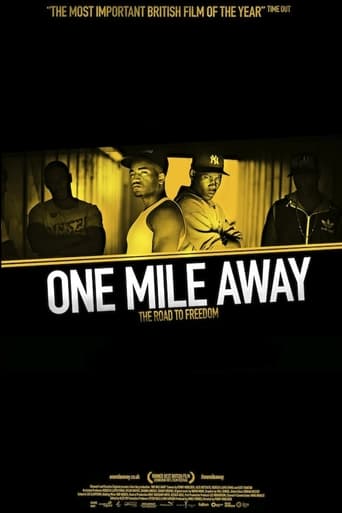Spikeopath
A frustrating experience all told. One Mile Away takes a lead face member from two of Birmngham's notorious black gangs, and follows their attempts at getting a truce born to stop the senseless maiming and killings that has followed the gang's escalating war. It starts off earnestly and grabs the attention with force, we yearn for Shabba and Flash to succeed, hope springs eternal, could we really see an end to all the death and misery wrung out by denizens of B6 and B21. Yet come the end I found myself at a loss as to how this could win the Michael Powell Award.My main problem with the film is that the battle for truce vanishes at the midpoint, and it gets to the point where you wonder if there is any point in these young men not killing each other? When the main protagonist proudly tells us that because his gun jammed he couldn't get done for attempted murder of a police man, what are you meant to feel about that?The discussion on the 2011 Mark Duggan riots was utterly bizarre, how can it ever be justified to loot the premises of the innocent? But that's exactly what they condone. The Charlene Ellis and Letisha Shakespeare killings became the nadir of this gang war, but all we get is a small amount of time afforded this critical moment in the troubles. To add insult to injury, we are told that a main boy will only talk on camera if he can expose the injustice of the Ellis/Shakespeare convictions.So we get one argument against the convictions, which admittedly was a pointed part of the prosecution, and god do we want safe prosecutions always in our societies, but there was a whole case book full of evidence used against those convicted. The film becomes really unbalanced and manipulative, with the director herself being manipulated whilst the protagonists - cum - antagonists, dig bigger holes for themselves from which they sadly can't get out of. Whilst at times it feels like a chance for numerous self promotion of rap records.What started out as a worthwhile incendiary piece of film, with bold intentions from film makers and participants alike, ends up posing more questions than answers. What started this war? It certainly wasn't just to do with postcode territory, and it is shameful of the film makers to ignore this as a starting point. We don't want people killing each other, no matter what race creed or colour they are, and we certainly don't want youngsters and young men offing each other before they can make something of themselves, but One Mile Away misses a big chance to be viable in today's Britain, and that's a real shame. 5/10
Dharmendra Singh
The violence arising out of the infamous rivalry between Birmingham's two most prominent gangs, the Burger Bar Boys and the Johnson Crew, whose postcodes – B21 and B6 – separate them by only a mile, has blighted the city for years. Millions of pounds have been spent trying to address the problem. Communities have been divided. Innocent lives have been lost, while others have been irrevocably shattered. One Mile Away may well be the most significant attempt to resolve this historic problem once and for all. Winner of the Edinburgh Film Festival's Michael Powell award for best British film, Penny Woolcock's documentary is a milestone. It transcends the medium by not just highlighting a problem, but by actively trying to tackle it. As proof of her commitment, she was able to persuade former MP James Purnell and key Northern Ireland peace architect Jonathan Powell to back this project; James as a Producer, Jonathan as an adviser.While the main aim is to broker a truce between 'Burgers' and 'Johnsons', the film also acts as a clarion call to young boys and girls to repel the lure of gang life and choose a more auspicious path.Dylan Duffus, aka D-Boy, and Matthias Thompson, aka Shabba, are the two very brave young men who take a big but necessary risk in bringing their respective gangs together. Initial efforts to enlist support for peace are met with great suspicion. Gang members on both sides accuse the men of having ulterior motives. But they persevere in spite of their odds. It would be wrong to judge this documentary solely in terms of its cinematic merit, though it is very well made. It is engaging, impeccably researched and deeply moving. The national resonance it is sure to have will be down to the fact that it has been made by a film maker who is really operating as a compassionate social activist.www.moseleyb13.com
